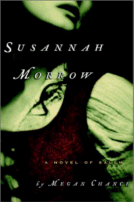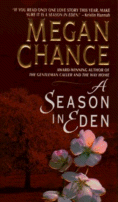Interview With Megan Chance
From a very young age, Megan Chance wanted to be a writer, but she made a brief detour at Western Washington University, where she received a B.A. in Broadcast Communications. After several years as a television news photographer, where she found that truth really was stranger than fiction, Megan left broadcasting to write stories of her own.Historical novels were an obvious choice. "The adaptability of the human spirit has always fascinated me, and historical novels allow me to explore that in a way that is both satisfying and life-affirming," says Megan. "I love immersing myself in another time. Luckily, I also love research-the more arcane, the better."
Born in Columbus, Ohio, Megan moved to Washington State as a girl. She currently lives near Seattle with her family.
How much research went into the creation of Susannah Morrow?
I did a great deal of research. As much as possible, I prefer to research from original sources. Many of the transcripts from the original trials are now available, and I utilized those, as well as Salem Village documents such as transcripts of legal conflicts between Salem Village and Salem Town, arrest warrants, examination testimony and various other documents referring to the accusations and trials. I also immersed myself in original Puritan writings, sermons, diaries and letters. I don't think it's possible to understand truly what happened in Salem without understanding the times and the people, so I read everything I could find on seventeenth-century New England and on Puritan theology and philosophy. My emphasis on original documentation gave me the freedom to develop my own theories of what might have happened in Salem Village in 1692.
Were there things you discovered in your research that surprised you?
 Click here for ordering information. |
Also, before I did the research, I'd always found it surprising that those who confessed to being witches were never tried and hung. From my safe and modern perspective, it seemed a perfect out-I wondered why more people didn't just confess and save their lives. But then I discovered that that those who confessed were spared only because the magistrates needed them to implicate others and provide evidence-evidence that was often secured under torture. The intention had always been to try and hang the confessed witches when they were no longer useful, and in fact, the only reason that never happened was because the governor put an end to the hysteria the week before the confessed witches were scheduled to go to trial.
What was the most startling revelation you came upon in your search?
The biggest surprise to me was that, viewed in the context of the culture and the times, the witch trials seemed inevitable.
By the end of the seventeenth century, Puritan domination was ending in New England; they were losing even their children to religious lifestyles that were less rigid and demanding. The threats of capitalism, foreign influences, and a changing economy grew stronger daily. Adding to these strains was the uncertainty of the political world under the new rule of William and Mary, and the constant financial and emotional drain of the Indian wars. Science was still in its infancy, and it was bound closely to religion-even Newton and Copernicus explained theoretical aberrations as God's physical manipulations. Medicine relied on prayer and herbal remedies.
 Click here for ordering information. |
Did you choose this topic, or did this topic choose you?
It definitely chose me. I've been fascinated by the Salem witch trials since I was very young. There are many young adult novels about witches in general (The Witch of Blackbird Pond, by Elizabeth George Speare), and many about the Salem witch trials in particular. I think I read most of them. I was always aware that I wanted to do a story set during that time. The complexities of it were fascinating. The story percolated in my head for several years before it became too compelling to ignore.
What effect did the real stories about the trials have on you, if any?
The stories still haunt me. The Puritans disliked the woods-they found them terrifying, full not just of the very real threat of Indians, but of evil-and I live in the woods. I found myself staring out at the trees, especially at night, imagining the terror and confusion these people must have felt, the things they believed they saw. Even coming at it from the perspective of modern knowledge, it was impossible to discount the power of their superstitions and beliefs, the hardship of their way of life. Beyond the fact of innocence or guilt, the stories of their lives were extremely affecting. Even now, there is so much still unknown in the world; it's easy to fill those gaps with the terror of your own imagination.
We often hear the phrase "history repeats itself." Looking at the current state of affairs in this country and abroad, how does the phrase apply in terms of the implications of "witch trials," and all that entails, if at all?
I think witch trials of one sort or another will always exist. Unfortunately, I believe it comes with being human. From McCarthyism to the Clinton impeachment to supposed satanic child sex rings, there will always be extreme reactions based on fear. Today, with 9/11 so fresh, it's extremely hard not to draw parallels. I think, whenever we're attacked with the things we truly fear, when we feel our children are in danger or our own lives in peril, we tend to retreat into superstition and let fear guide us. In spite of our modernity, the human heart is essentially no different than it was in the seventeenth century. In the grip of fear, rationality is the first thing we lose. That's a lesson humanity must learn over and over again-it never seems to stick.
Susannah Morrow is written from the point of view of all three main characters. Whose point of view was the most difficult to write?
Susannah's viewpoint was the most difficult. Susannah is a rational woman in an irrational time, and it would seem that I would be able to relate to many of her experiences. But she was also fairly immutable-she's a catalyst character, without much in the way of growth herself, and she is also a stranger in what she views as a fairly primitive village and a restrictive culture. The danger was in making her too objective, too much a modern voice. I wanted her to be both a woman of her time and a guidepost for the reader, and that was a difficult balance to capture.
Many of the characters in the novel are real people. How difficult was it to blend fiction with historical fact?
In some ways, it was easy. The transcripts and timeline of the real events provided a framework. The difficulty lay in taking known personalities who were closely associated with Salem (Reverend Parris, John Proctor, Tituba) and working around reader expectation to present a story that was as true to the facts as I could make it. Because the witch trials were so tied to certain personalities and events, I felt I had to use them. Their words are public record, the events that preceded the trials are as well. I felt it lent a reality and complexity to the story to use the real people. My goal was to make the novel as true to life as possible, while still making it a good story.
What is the most difficult aspect of writing historical fiction? What is the most rewarding aspect?
The most difficult aspect is the responsibility I feel for getting the historical aspect right. The most rewarding aspect is when I discover something during research that is truly inspiring-a great idea, an unexpected tidbit, a detail that brings the entire story into focus...I love research, and I love the challenge of turning it into fiction.
(November, 2002)
Posted with permission of TWBookmark.com.
